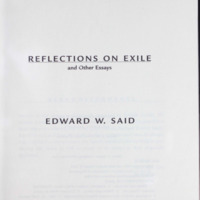-
Title
-
Reflections on exile and other essays
-
Description
-
Edward Said's volume contains nearly 50 essays on literature, culture, the Middle East, philosophy, history, the arts, and current events.
-
Identifier
-
961052
-
674003020
-
Creator
-
Said, Edward W
-
Source
-
Brian Lamb Booknotes Collection
-
Gift of Brian Lamb, 2011.
-
Catalog record
-
Language
-
eng
-
Date
-
2000
-
Program air date: June 17, 2001
-
Publisher
-
Harvard University Press
-
George Mason University. Libraries. Special Collections & Archives
-
Subject
-
"Politics and literature."
-
"Literature, Modern--20th century--History and criticism--Theory, etc."
-
"Politics and culture."
-
"Criticism--Political aspects."
-
"Literature, Modern--20th century--History and criticism."
-
Relation
-
Original Booknotes interview
-
Rights
-
This work may be protected by copyright laws and is provided for educational and research purposes only. Any infringing use may be subject to disciplinary action and/or civil or criminal liability as provided by law. If you believe that you are the rights-holder and object to Mason’s use of this image, please contact speccoll@gmu.edu.
-
Text
-
Transcription of Annotations
Notes from front endpapers: "Tuesday, Apr. 24. - Jerusalem Center for Public Affairs: principles founded by Mike Melken [?]. - Justus Reid Weiner. - 1993: Oslo Accord, p. 63-99. - A few annotations by Brian Lamb in the margins and underlining of some pertinent phrases throughout the book. -- Examples: p. xv: "...a great revision has taken place in cultural discussion which in my own way I feel I have contributed to, namely, the critique of Eurocentrism...". - p. 188: "Yet all of these Parisian intellectuals were deeply rooted in the political actualities of French life, the great milestones of which were World War II, the response to European communism, the Vietnamese and Algerian colonial wars, and May 1968. Beyond France, it was Germany and German thought that mattered most, rarely the work of British or American writers." - p. 500: "In other universities in other parts of the world, of course, the academy is part of the political system and academic appointments are necessarily, very often the case, outright political appointments." - p. 506: "I think the proper attitude of the intellectual outside the academy is some sort of defiance. ...it is much more important than getting one more award or one more prize." - p. 573: "Is it wise as an intellectual and a scholarly expert to produce a simplified map of the world and then hand it to generals and civilian law-makers as a prescription for first comprehending and then acting in the world?"
 961052.pdf
961052.pdf